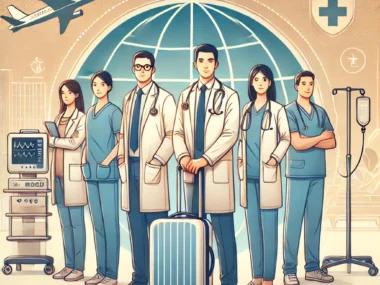The United States, often referred to as the land of opportunities, continues to be a global destination for professionals across various industries seeking rewarding careers. One of the most secure and prestigious employment paths is government jobs.
These roles come with significant benefits, including job security, competitive salaries, healthcare, and retirement plans. For non-U.S. citizens or foreign workers, the opportunity to work in the U.S. government often depends on visa sponsorship programs.
This blog post will explore government jobs in the United States in 2024 that offer visa sponsorship, how to navigate the application process, and what prospective international applicants should know to increase their chances of landing a position.
1. Understanding U.S. Government Employment
The U.S. government operates one of the most extensive and complex employment systems in the world. As the largest employer in the country, it offers a wide variety of jobs across sectors including healthcare, defense, education, cybersecurity, engineering, and more. These roles exist within different levels of government: federal, state, and local.
The U.S. government is made up of several departments, agencies, and bureaus, such as:
- The Department of Homeland Security (DHS)
- The Department of Defense (DoD)
- The National Aeronautics and Space Administration (NASA)
- The U.S. Department of Health and Human Services (HHS)
- The Federal Bureau of Investigation (FBI)
Positions within these agencies can vary widely from administrative roles to specialized positions in science, technology, engineering, and mathematics (STEM), as well as in law enforcement, foreign service, and intelligence.
2. Visa Sponsorship for Government Jobs
When it comes to visa sponsorship for non-U.S. citizens seeking government jobs, the opportunities are relatively limited due to specific eligibility requirements. U.S. federal government jobs often require applicants to be U.S. citizens due to security concerns and the sensitive nature of some roles. However, there are exceptions, especially in fields where the government experiences shortages or where specific expertise is required.
For non-citizens, visa sponsorship typically occurs under special conditions, often through government contractors or in certain specialized roles within agencies that have international reach. The following are some visa types that are commonly associated with foreign nationals seeking employment in the U.S. government or through government-related contractors:
- H-1B Visa: This visa allows U.S. companies to employ foreign workers in specialty occupations. Government contractors and certain government-related projects in industries like defense, technology, and healthcare often hire foreign workers under H-1B visas.
- L-1 Visa: This visa is for international companies transferring employees from a foreign office to a U.S. office. Some multinational companies that work on government contracts may use the L-1 visa to bring specialized foreign talent to the U.S.
- J-1 Visa: For exchange visitors in government-approved programs for education, training, and research. Many federal agencies sponsor programs for researchers, specialists, and other international experts under this category.
- O-1 Visa: For individuals with extraordinary ability in the sciences, arts, education, business, or athletics. U.S. government agencies, particularly in research and development sectors, may sponsor foreign nationals who possess exceptional expertise in their field.
3. Types of U.S. Government Jobs Open to Foreign Nationals
While most federal government jobs are reserved for U.S. citizens, certain roles—especially those in research, healthcare, technology, and defense contracting—may be open to foreign nationals under special circumstances. Here are some sectors where visa sponsorship is more likely to occur:
a. Healthcare
Healthcare roles within federal agencies, such as the Department of Veterans Affairs (VA), Centers for Disease Control and Prevention (CDC), and the National Institutes of Health (NIH), are often open to international professionals due to ongoing shortages of healthcare workers in the U.S. These agencies seek foreign professionals with expertise in areas like epidemiology, virology, oncology, and public health. Moreover, federal agencies often collaborate with international organizations, increasing the likelihood of hiring foreign professionals.
b. Scientific Research
The U.S. government has a robust scientific research community that collaborates with international researchers. Agencies like NASA, NIH, and the Department of Energy (DOE) frequently engage in international research and may hire foreign professionals for specialized scientific roles. The O-1 visa is often used in such cases, particularly for researchers who have made significant contributions to their fields. Similarly, J-1 visa holders can participate in research and educational exchange programs at federal laboratories and academic institutions.
c. Defense and Aerospace Contracting
While direct employment within agencies such as the Department of Defense or NASA usually requires U.S. citizenship, many private companies contracted by the government offer roles that are open to foreign nationals, especially in engineering, aerospace, and cybersecurity. These contractors often sponsor H-1B and L-1 visas for foreign professionals with specialized skills.
For example, large defense contractors like Lockheed Martin, Northrop Grumman, and Boeing regularly work on government projects and have historically sponsored foreign workers under visa programs.
d. Cybersecurity and Information Technology
With increasing concerns over cybersecurity and the protection of national infrastructure, the U.S. government, as well as private companies under government contract, are in constant need of IT professionals and cybersecurity experts. While federal government positions in cybersecurity are mostly limited to U.S. citizens, private companies working on government contracts often hire foreign nationals and sponsor H-1B or L-1 visas.
e. Education and Cultural Programs
Certain educational and cultural exchange programs run by the U.S. Department of State offer visa sponsorship through the J-1 visa program. These roles are often in academia, international relations, or cultural outreach, allowing foreign nationals to work in the U.S. for a limited period while participating in government-led educational and cultural programs.
4. Pathways to U.S. Government Employment for Foreign Nationals
While federal government jobs are often reserved for U.S. citizens, there are pathways that allow foreign nationals to work in government-related roles:
a. Government Contractors
Many foreign nationals find employment with companies that contract with the U.S. government. These companies work on defense, technology, healthcare, and infrastructure projects. Since they are not directly part of the federal government, they may have more flexibility in hiring foreign nationals under visa sponsorship programs. Notable contractors that frequently sponsor visas include:
- Lockheed Martin
- Raytheon Technologies
- Boeing
- Northrop Grumman
- General Dynamics
These companies, while working on sensitive government projects, are often exempt from the U.S. citizenship requirement that applies to direct government jobs.
b. Non-Competitive Eligibility for Certain Programs
Foreign nationals who participate in certain programs, such as Fulbright scholars, Peace Corps volunteers, or individuals working for international organizations like the United Nations, may be eligible for non-competitive eligibility (NCE) status. NCE allows them to apply for certain federal jobs without going through the standard competitive hiring process, which can be an advantage when seeking government roles.
c. Academic and Research Institutions Affiliated with the Government
Many U.S. academic institutions have partnerships with government agencies for research and development projects. For instance, universities that receive funding from the NIH, DOE, or NASA often collaborate on research that can include foreign nationals. These institutions may sponsor H-1B visas for foreign researchers and professors.
d. Temporary Work and Exchange Programs
Temporary work visas, such as the J-1 and H-1B, can provide an entry point for foreign nationals into government-related work. For example, individuals working in academic research or public health through a J-1 exchange program may transition into government-affiliated roles, either directly or through government contractors.
5. The Application Process for Government Jobs
Applying for a government job, whether directly with a federal agency or through a contractor, requires navigating specific processes. Here are the general steps for applying for government jobs with visa sponsorship:
a. Identify Job Opportunities
- Visit official government job portals such as USAJobs (www.usajobs.gov) for federal positions.
- For contractor roles, explore job listings on company websites like Lockheed Martin, Boeing, or Raytheon.
- Use professional networking platforms like LinkedIn to identify companies that sponsor visas for government-related work.
b. Tailor Your Application
Government jobs require detailed applications. Ensure that your resume and cover letter are tailored to the specific role and highlight your qualifications. Include any relevant experience with government contracts, specialized skills, or international work that aligns with the job description.
c. Understand Security Clearance Requirements
Many government jobs, especially in defense and intelligence, require security clearance. Non-U.S. citizens are generally ineligible for positions requiring high-level clearance, but certain roles in government-affiliated organizations or research do not require such clearance.
d. Prepare for Visa Sponsorship
Ensure you meet the requirements for the visa you are applying for (H-1B, L-1, J-1, etc.). Work closely with your potential employer to understand their sponsorship process and timeline.
6. Challenges and Considerations for International Applicants
While there are opportunities for foreign nationals to work in government-affiliated roles, there are challenges that international applicants should be aware of:
- Limited Availability of Sponsorship: Federal government roles that offer visa sponsorship are relatively rare compared to private sector opportunities. Most federal jobs still require U.S. citizenship, especially those related to national security.
- Competition for H-1B Visas: The H-1B visa program is competitive, with an annual cap on the number of visas issued. Applicants should be prepared for the possibility of not being selected in the lottery process.
- Security Clearance: Many government roles, especially in defense and intelligence, requireGovernment of the United States Jobs 2024 with Visa Sponsorship: A Comprehensive Guide

